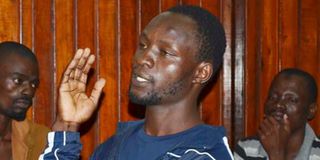
Ngina Kitheka whose body was found stuffed in a wardrobe at her home in Mtwapa, Kilifi County, in May 2021.
| Brian Ocharo I Nation Media GroupNews
Premium
Jacqueline Ngina murder: How mobile phone gave away suspect Robert Kinisu
What you need to know:
- Jacqueline was killed at her apartment and her body stashed in a wardrobe in her bedroom.
- So on May 23, 2021, as Kinisu was gulping a bottle of beer, detectives pounced on him as the prime suspect.
On a warm Sunday afternoon on May 23, 2021, Robert Waliaula Kinisu, a prime suspect in the gruesome murder of a businesswoman, was sitting in a tent outside an entertainment joint in Mtwapa oblivious of what was about to happen to him.
For more than a week, detectives in Mtwapa had been scratching their heads, unable to solve the mystery surrounding the murder of Jacqueline Ngina Kitheka, who was murdered at her Marina apartment and her body stashed in a wardrobe in her bedroom.
The killer had left no trace after fleeing with the woman's cellphone, cleaning the room and applying formalin to the murder scene to prevent the foul odour from alerting the deceased's neighbours.
But the obstinate foul odour refused to cooperate with the murderer, alerting the neighbours that something was wrong.
According to court documents, the murder occurred between May 3 and 6, 2021.
So on May 23, 2021, as Kinisu was gulping a bottle of beer, detectives pounced on him as the prime suspect.
Police Constable Dennis Ismek, who cracked the mysterious murder, provided insights into the investigation that led to the arrest of Kinisu.
He told Mombasa High Court Judge Ann Ongi’injo they were alerted to the murder and quickly rushed to the scene where they found the woman’s body concealed in a wardrobe.
They retrieved it and transferred it to the Coast General Teaching and Referral Hospital mortuary.
“The first steps in the investigation was to trace the deceased’s phone number because her phone was missing,” he said while being led by State Counsel Bernard Ngiri.

Robert Waliaula Kinisu in a Mombasa court on August 3, 2016. He has been charged with the murder of Mtwapa businesswoman Jacqueline Ngina Kitheka.
After obtaining the number, they reached out to Safaricom, the mobile service provider, to acquire data on numbers that had communicated with the deceased. Through this process, they narrowed down to a specific number that had called the deceased before her demise.
They also obtained messages that led them to Kinisu as the person of interest.
To approach the suspect indirectly, the police enlisted Safaricom’s assistance to locate the closest family member or friend who had communicated with the number associated with the person of interest.
This led them to Mr Hamisi Mohamed, who was identified as a shylock at the time and had a shop in Mtwapa. It is at Mr Mohamed’s shop where items stolen from Kitheka’s house were found.
The officers then confiscated Mohamed’s phone and made an inquiry call to the number of the person of interest (Kinisu), confirming their association. When asked about Kinisu , Mr Mohamed acknowledged knowing him, stating that he had brought items to his shop for sale.
The police accompanied Mr Mohamed to his shop, where they recovered and took inventory of the items brought by Kinisu. The items included a blender, iron box, juice mixer and a toaster.
Kinisu had been paid Sh1,550 via M-Pesa for these items.
To find out more about the suspect, the detectives reached out again to Safaricom for an additional number connected to the suspect's associates. A call to the additional number linked the police to a woman named Scholastica Makokha, who detectives asked to visit the Mtwapa police station. Minutes later, after a call was made to Ms Makokha, a man claiming to be her husband called the officer, questioning the purpose of the call.
It later turned out Ms Makokha was at the time in a relationship with Kinisu, and they were living together at an apartment in Mtwapa.
Later, Kinisu contacted the officer, suggesting a meeting to address any issue that the police may have had against his girlfriend. However, the meeting did not take place as Kinisu failed to show up.
Constable Ismek and his colleague Diba Halake called off the meeting at midnight.
The following day, Ms Makokha visited the Mtwapa police station, where she was interrogated about her relationship with Kinisu. She confirmed that Kinisu was her boyfriend and mentioned that he had brought utensils and household items to their house.
With Kinisu's identity confirmed, the police began tracking his number, which indicated that he was in close proximity to the Mtwapa police station. Upon spotting Kinisu outside an entertainment joint, imbibing a cold beer, the police pounced on him. Ms Makokha positively identified him at the police station.
Kinisu and Ms Makokha were then escorted to their residence, where additional items belonging to the deceased were discovered. While Ms Makokha was turned into a prosecution witness, her boyfriend was escorted to court and charged with the murder of Ms Kitheka.
Mr Francis Mwabili testified that the deceased had been placed in his friend's room after her murder.
Mr Mwabili , who was a taxi driver and was familiar with Kitheka’s house, affirmed that the items produced in court indeed belonged to the deceased , as he had seen them in her house during his many visits.
“I don't know the suspect but I knew the deceased. She had a White boyfriend but was mostly living alone,” he said while being cross-examined by Kinisu’s advocate Derick Mwanzia.
The police are expected to produce messages detailing the deceased’s conversations with Kinisu in the days preceding her death.
Mr Ismek was stood down after the suspect’s advocate, Mr Mwanzia, protested that he had not been served with the documents, including the call logs from Safaricom, that the witness had relied on in his testimony.
Kinisu has, however, denied committing the offence. The matter will proceed on July 28.





